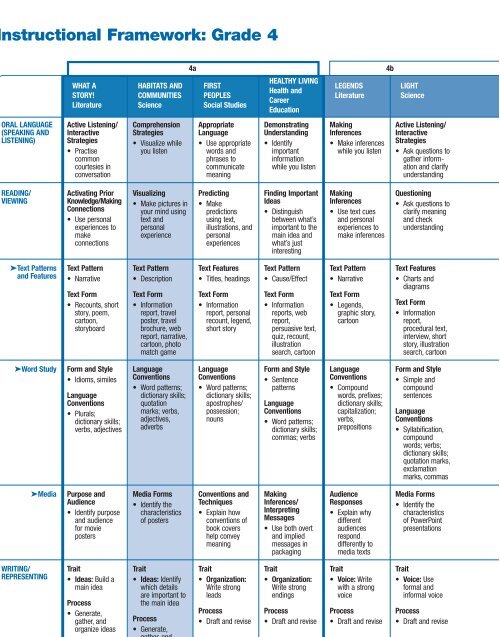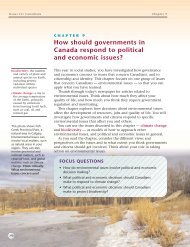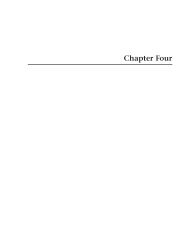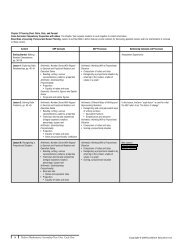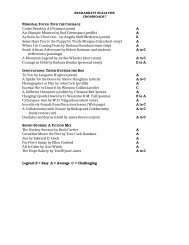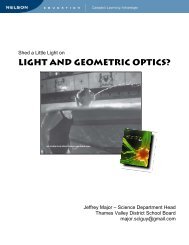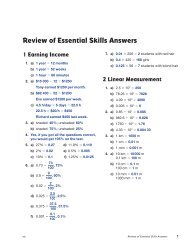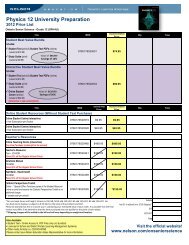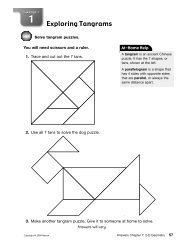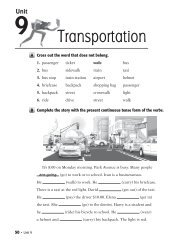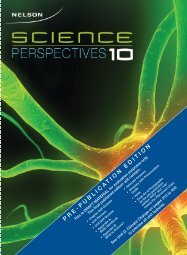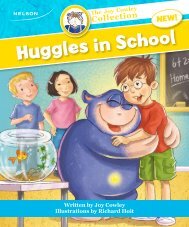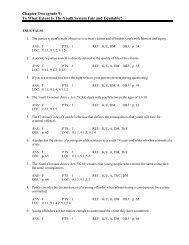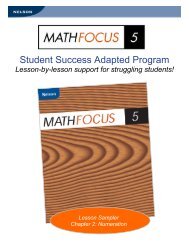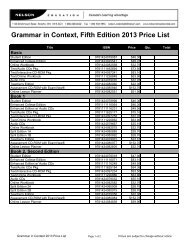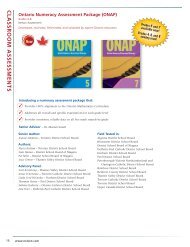Teacher's Resource - Nelson Education
Teacher's Resource - Nelson Education
Teacher's Resource - Nelson Education
Create successful ePaper yourself
Turn your PDF publications into a flip-book with our unique Google optimized e-Paper software.
Instructional Framework: Grade 4<br />
WHAT A<br />
STORY!<br />
Literature<br />
HABITATS AND<br />
COMMUNITIES<br />
Science<br />
4a<br />
FIRST<br />
PEOPLES<br />
Social Studies<br />
HEALTHY LIVING<br />
Health and<br />
Career<br />
<strong>Education</strong><br />
LEGENDS<br />
Literature<br />
4b<br />
LIGHT<br />
Science<br />
ORAL LANGUAGE<br />
(SPEAKING AND<br />
LISTENING)<br />
Active Listening/<br />
Interactive<br />
Strategies<br />
• Practise<br />
common<br />
courtesies in<br />
conversation<br />
Comprehension<br />
Strategies<br />
• Visualize while<br />
you listen<br />
Appropriate<br />
Language<br />
• Use appropriate<br />
words and<br />
phrases to<br />
communicate<br />
meaning<br />
Demonstrating<br />
Understanding<br />
• Identify<br />
important<br />
information<br />
while you listen<br />
Making<br />
Inferences<br />
• Make inferences<br />
while you listen<br />
Active Listening/<br />
Interactive<br />
Strategies<br />
• Ask questions to<br />
gather information<br />
and clarify<br />
understanding<br />
READING/<br />
VIEWING<br />
Activating Prior<br />
Knowledge/Making<br />
Connections<br />
• Use personal<br />
experiences to<br />
make<br />
connections<br />
Visualizing<br />
• Make pictures in<br />
your mind using<br />
text and<br />
personal<br />
experience<br />
Predicting<br />
• Make<br />
predictions<br />
using text,<br />
illustrations, and<br />
personal<br />
experiences<br />
Finding Important<br />
Ideas<br />
• Distinguish<br />
between what’s<br />
important to the<br />
main idea and<br />
what’s just<br />
interesting<br />
Making<br />
Inferences<br />
• Use text cues<br />
and personal<br />
experiences to<br />
make inferences<br />
Questioning<br />
• Ask questions to<br />
clarify meaning<br />
and check<br />
understanding<br />
➤Text Patterns<br />
and Features<br />
Text Pattern<br />
• Narrative<br />
Text Form<br />
• Recounts, short<br />
story, poem,<br />
cartoon,<br />
storyboard<br />
Text Pattern<br />
• Description<br />
Text Form<br />
• Information<br />
report, travel<br />
poster, travel<br />
brochure, web<br />
report, narrative,<br />
cartoon, photo<br />
match game<br />
Text Features<br />
• Titles, headings<br />
Text Form<br />
• Information<br />
report, personal<br />
recount, legend,<br />
short story<br />
Text Pattern<br />
• Cause/Effect<br />
Text Form<br />
• Information<br />
reports, web<br />
report,<br />
persuasive text,<br />
quiz, recount,<br />
illustration<br />
search, cartoon<br />
Text Pattern<br />
• Narrative<br />
Text Form<br />
• Legends,<br />
graphic story,<br />
cartoon<br />
Text Features<br />
• Charts and<br />
diagrams<br />
Text Form<br />
• Information<br />
report,<br />
procedural text,<br />
interview, short<br />
story, illustration<br />
search, cartoon<br />
➤Word Study<br />
Form and Style<br />
• Idioms, similes<br />
Language<br />
Conventions<br />
• Plurals;<br />
dictionary skills;<br />
verbs, adjectives<br />
Language<br />
Conventions<br />
• Word patterns;<br />
dictionary skills;<br />
quotation<br />
marks; verbs,<br />
adjectives,<br />
adverbs<br />
Language<br />
Conventions<br />
• Word patterns;<br />
dictionary skills;<br />
apostrophes/<br />
possession;<br />
nouns<br />
Form and Style<br />
• Sentence<br />
patterns<br />
Language<br />
Conventions<br />
• Word patterns;<br />
dictionary skills;<br />
commas; verbs<br />
Language<br />
Conventions<br />
• Compound<br />
words, prefixes;<br />
dictionary skills;<br />
capitalization;<br />
verbs,<br />
prepositions<br />
Form and Style<br />
• Simple and<br />
compound<br />
sentences<br />
Language<br />
Conventions<br />
• Syllabification,<br />
compound<br />
words; verbs;<br />
dictionary skills;<br />
quotation marks,<br />
exclamation<br />
marks, commas<br />
➤Media<br />
Purpose and<br />
Audience<br />
• Identify purpose<br />
and audience<br />
for movie<br />
posters<br />
Media Forms<br />
• Identify the<br />
characteristics<br />
of posters<br />
Conventions and<br />
Techniques<br />
• Explain how<br />
conventions of<br />
book covers<br />
help convey<br />
meaning<br />
Making<br />
Inferences/<br />
Interpreting<br />
Messages<br />
• Use both overt<br />
and implied<br />
messages in<br />
packaging<br />
Audience<br />
Responses<br />
• Explain why<br />
different<br />
audiences<br />
respond<br />
differently to<br />
media texts<br />
Media Forms<br />
• Identify the<br />
characteristics<br />
of PowerPoint<br />
presentations<br />
WRITING/<br />
REPRESENTING<br />
Trait<br />
• Ideas: Build a<br />
main idea<br />
Process<br />
• Generate,<br />
gather, and<br />
organize ideas<br />
Trait<br />
• Ideas: Identify<br />
which details<br />
are important to<br />
the main idea<br />
Process<br />
• Generate,<br />
gather, and<br />
organize ideas<br />
Trait<br />
• Organization:<br />
Write strong<br />
leads<br />
Process<br />
• Draft and revise<br />
Trait<br />
• Organization:<br />
Write strong<br />
endings<br />
Process<br />
• Draft and revise<br />
Trait<br />
• Voice: Write<br />
with a strong<br />
voice<br />
Process<br />
• Draft and revise<br />
Trait<br />
• Voice: Use<br />
formal and<br />
informal voice<br />
Process<br />
• Draft and revise<br />
6 <strong>Nelson</strong> Literacy 4 Teacher’s <strong>Resource</strong>: Habitats and Communities<br />
NEL


